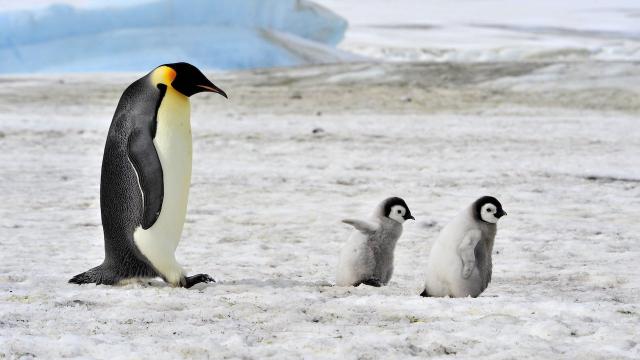Emperor penguins are at severe risk of extinction by 2060, biologist Marcela Libertelli, who studies the birds at the Argentine Antarctic Institute, told Reuters in a Friday report. The scientist attributed that increasing extinction threat largely to climate change, as the seasonal sea ice emperor penguins need becomes less and less reliable.
“[Climate] projections suggest that the colonies that are located between latitudes 60 and 70 degrees [south] will disappear in the next few decades; that is, in the next 30, 40 years,” Libertelli told Reuters.
Other research supports this claim. One 2021 study published in the journal Global Change Biology estimated that 98% of emperor penguin colonies could disappear within the century if greenhouse gas emissions continue unabated.
The biggest reason emperor penguins can’t easily adapt to climate change comes down to sea ice. The flightless birds have been historically considered sea ice “obligate.” To breed, they depend on parts of the Southern Ocean freezing on schedule and for that ice to stick around until the Antarctic summer.
Right now, it’s autumn in the southern hemisphere, and emperor penguins are just beginning to lay and incubate their eggs. To do this, the birds come ashore to the same colony sites on sea ice, year after year. There, they breed with only one mate and nurture just one egg that hatches into a single chick, annually. Penguin parents put all their egg in one basket, so to speak.
If everything goes well, that chick grows to be ocean-ready in a few months. “[In] December, the older chicks are almost feathered and ready to go to sea for the first time. Their new feathers are waterproof and will prevent them from freezing,” wrote Libertelli in an email to Gizmodo.
But breeding colonies are under threat as sea ice freezes later, thaws earlier, or fails unexpectedly mid-season. If the ice breaks up before newly hatched chicks are mature enough, the adults can swim away unscathed, but the young birds will die. “The unfeathered chicks will drown and freeze to death,” wrote Libertelli in her email.
Although some penguin colonies are found on less meltable ice shelves, as opposed to sea ice, most shelves aren’t ideal habitat for emperors and are prone to disturbances like iceberg calving. Only four out of more than 50 colonies have been regularly identified on ice shelves.
Libertelli leads Argentina’s emperor penguin monitoring at two colonies in the western Weddell Sea, each with under 10,000 individuals. But in recent years, the second largest of all known colonies, Halley Bay, was struck by catastrophe. British researchers monitored Halley Bay by satellite between 2016 and 2018 and observed that almost all of the chicks that hatched there during that time died. The Halley Bay colony shrunk from about 30,000-50,000 birds down to near-nothing, in what the scientists described as “three years of almost total breeding failure,” in a 2019 study published in the journal Antarctic Science.
The UK researchers linked the Halley Bay failure to a particularly strong El Niño event, but climate change is certainly impacting Antarctic ice as well. NASA data has demonstrated that Antarctica has been continually losing total ice mass since 2002. Earlier this year, Antarctic sea ice hit a new record low. Antarctic sea ice is cyclical and influenced by many other factors besides climate change, like ocean currents, so, it’s hard to draw any direct line between the of current level of Antarctic sea ice and climate change. Future models though, do predict worsening climate change will lead to less Antarctic sea ice.
The small silver lining is that the loss of birds at Halley Bay did correspond with an increase in numbers at another, nearby colony — suggesting that many of those penguins moved elsewhere. And that, although loyal to breeding sites, emperor penguins can relocate if a place becomes untenable.
Libertelli agrees that penguins have some adaptability. “With less ice cover, or less thick ice cover, emperors will choose to move their colonies to safe places,” she wrote.
But climate change may soon make it so that nowhere is safe. “The future question is whether these ‘safer places’ will still exist. Or, whether the face of this continent will have changed so much that it no longer supports this species,” Libertelli added.
There’s an estimated 500,000 or so emperor penguins on Earth. They’re the largest of all penguin species and are currently considered “near threatened” by the International Union for Conservation of Nature. A proposal to list the birds as “threatened” is also under consideration by the U.S. Fish and Wildlife Service.
In an extreme place like Antarctica, where there are very few species, the loss of emperor penguins could have a massive impact on the entire continent’s ecosystem, Libertelli told Reuters. But, even if it were just a question of the penguins themselves, “the disappearance of any species is a tragedy for the planet,” she added. “Whether small or large, plant or animal — it doesn’t matter. It’s a loss for biodiversity.”
